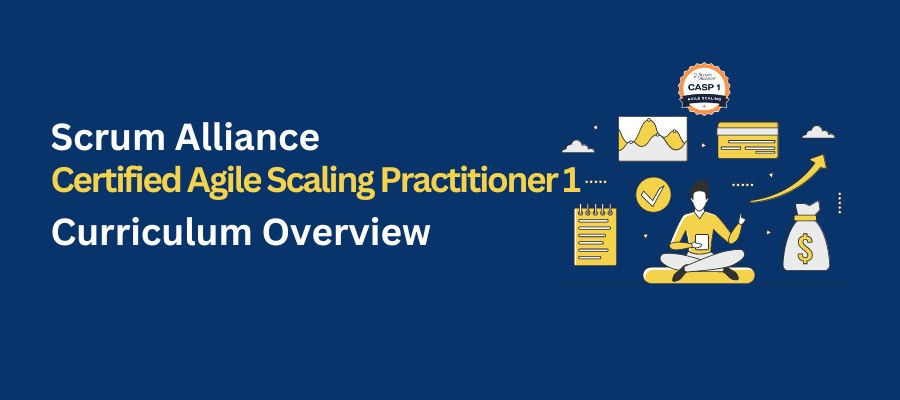Scrum Alliance Certified Agile Scaling Practitioner 1 (CASP 1): Curriculum Overview

Do you want to scale your Agile practices across your organization? Then, the Certified Agile Scaling Practitioner credentials from Scrum Alliance is a fantastic opportunity to do so! This certification equips you with the knowledge and skills to tackle scaling Agile's complexities in diverse organizational settings. So, to become a Certified Agile Scaling Practitioner, you must first review the curriculum and learning objectives of the CASP 1 certification!
The CASP Curriculum Overview: Detailed Learning Objectives Explained
Let’s understand how the Agile Scaling Course will train you to become a master of implementing successful agile strategies for scaling across organizations. Here’s what this course will teach you to deliver better results to your customers by scaling agile, which is the best path forward!
Part 1: Understanding Scaling in Agile
Scaling Agile involves expanding Agile practices beyond a single team to the entire organization. As you embark on the CASP certification journey, you’ll explore the fundamental concepts of scaling and its significance in achieving business agility. You will learn to define scaling in the context of Agile and understand its relationship with business agility.
- The Need for Scaling: Organizations often need to scale to improve workflow and handle complex projects that a single team can't manage alone. So, first, you learn about the causes and benefits of scaling in Agile that you can use to envision your organization's future state.
- The Philosophy Behind Scaling: The CASP curriculum emphasizes different approaches to scaling, such as principle-led, practice-led (framework, methodology, toolbox), and pattern-led approaches. You’ll analyze the risks and benefits of each approach and understand why a dynamic approach is often more successful than a static one.
- Challenges of Scaling: In product development, you will learn to identify and differentiate between complicated, complex, and chaotic work environments. You can then easily recognize these distinctions and predict future risks to choose the right approach.
You'll also explore the importance of a systems-thinking approach, which offers a holistic understanding of the organization and avoids sub-optimizations.
Part 2: Using Patterns to Overcome Challenges
Patterns are essential tools in your scaling toolkit. They provide structured solutions to common problems encountered when scaling Agile practices. In this second segment of the CASP course curriculum, you will learn what patterns are and understand how to use patterns effectively:
- Avoiding Anti-Patterns: Recognizing anti-patterns and ineffective practices that can hinder your scaling efforts is just as crucial as understanding functional patterns. You’ll learn to identify and prevent these anti-patterns to ensure your scaling strategy remains effective.
- Frameworks and Patterns: The curriculum covers the relationship between frameworks and patterns. While frameworks provide a structured approach to scaling, they have limitations. You’ll explore how patterns can complement frameworks and provide flexibility in your scaling efforts.
- Selecting the Right Patterns: The Agile Scaling Course teaches you how to find and choose the suitable patterns for your organization. You’ll learn to identify sources of patterns both within and outside your organization and discuss how to apply Agile principles to scale effectively.
Thus, this second part of the course curriculum provides enough practical examples to help you understand how to choose appropriate patterns for specific scaling scenarios. You learn to identify common pain points and select appropriate patterns to address these issues.
Part 3: Scaling Successfully and Sustainably
As we come to the third and last segment of the Certified Agile Scaling Practitioner Course Curriculum, let’s quickly discuss the main learning objectives covered in it:
- Identifying and Prioritizing Challenges: This segment teaches you to identify common mistakes in change management and predict scaling challenges within different organizational structures. You discover the key components to resolve these challenges from a value-delivery perspective.
- Using Scaffolds: Scaffolds are transitional structures that support organizational transformation. In this segment, you’ll learn to define scaffolds and identify transitional structures that make scaling safer. It also covers the lifecycle of good practices in growing organizations.
- Organizational Change Management (OCM): OCM is a critical aspect of scaling Agile, and ignoring it can pose significant risks. You’ll explore iterative and incremental models that include safe-to-fail experimentation.
So, the last segment of the curriculum emphasizes the importance of measuring the success of organizational changes and building the right OCM team. You also get hands-on experience through real-world examples of scaling and moving from defined frameworks to agility-based models.
How To Apply For The CASP Certification: Finding The Suitable Agile Scaling Course
To register for the CASP course, visit the Scrum Alliance website or other accredited training providers like PremierAgile. These platforms offer detailed information about the course schedule, fees, and prerequisites.
The CASP course is delivered through workshops, hands-on exercises, and interactive sessions led by experienced Agile Coaches and Trainers. These sessions provide a deep dive into the curriculum and ensure you can apply the concepts in real-world scenarios.
Visit the course page, select your preferred schedule, and complete the registration form. Payment options are available online, and you’ll receive confirmation upon successful registration.
Upon completing the CASP course, you’ll be equipped with advanced skills in scaling Agile practices. The knowledge and skills acquired will help you navigate the complexities of scaling and lead your teams toward greater efficiency and collaboration.
Reference:
https://www.scrumalliance.org/get-certified/certified-agile-skills-scaling-1



